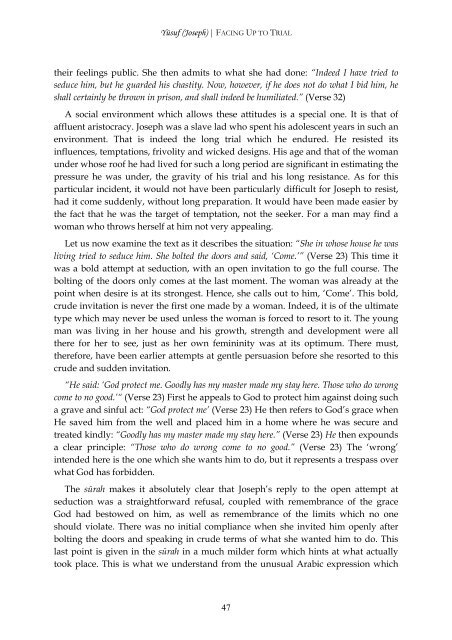Volume 10 Surah 12 - 15 - Enjoy Islam
Volume 10 Surah 12 - 15 - Enjoy Islam
Volume 10 Surah 12 - 15 - Enjoy Islam
You also want an ePaper? Increase the reach of your titles
YUMPU automatically turns print PDFs into web optimized ePapers that Google loves.
Yūsuf (Joseph) | FACING UP TO TRIAL<br />
their feelings public. She then admits to what she had done: “Indeed I have tried to<br />
seduce him, but he guarded his chastity. Now, however, if he does not do what I bid him, he<br />
shall certainly be thrown in prison, and shall indeed be humiliated.” (Verse 32)<br />
A social environment which allows these attitudes is a special one. It is that of<br />
affluent aristocracy. Joseph was a slave lad who spent his adolescent years in such an<br />
environment. That is indeed the long trial which he endured. He resisted its<br />
influences, temptations, frivolity and wicked designs. His age and that of the woman<br />
under whose roof he had lived for such a long period are significant in estimating the<br />
pressure he was under, the gravity of his trial and his long resistance. As for this<br />
particular incident, it would not have been particularly difficult for Joseph to resist,<br />
had it come suddenly, without long preparation. It would have been made easier by<br />
the fact that he was the target of temptation, not the seeker. For a man may find a<br />
woman who throws herself at him not very appealing.<br />
Let us now examine the text as it describes the situation: “She in whose house he was<br />
living tried to seduce him. She bolted the doors and said, ‘Come.’” (Verse 23) This time it<br />
was a bold attempt at seduction, with an open invitation to go the full course. The<br />
bolting of the doors only comes at the last moment. The woman was already at the<br />
point when desire is at its strongest. Hence, she calls out to him, ‘Come’. This bold,<br />
crude invitation is never the first one made by a woman. Indeed, it is of the ultimate<br />
type which may never be used unless the woman is forced to resort to it. The young<br />
man was living in her house and his growth, strength and development were all<br />
there for her to see, just as her own femininity was at its optimum. There must,<br />
therefore, have been earlier attempts at gentle persuasion before she resorted to this<br />
crude and sudden invitation.<br />
“He said: ‘God protect me. Goodly has my master made my stay here. Those who do wrong<br />
come to no good.’“ (Verse 23) First he appeals to God to protect him against doing such<br />
a grave and sinful act: “God protect me’ (Verse 23) He then refers to God’s grace when<br />
He saved him from the well and placed him in a home where he was secure and<br />
treated kindly: “Goodly has my master made my stay here.” (Verse 23) He then expounds<br />
a clear principle: “Those who do wrong come to no good.” (Verse 23) The ‘wrong’<br />
intended here is the one which she wants him to do, but it represents a trespass over<br />
what God has forbidden.<br />
The sūrah makes it absolutely clear that Joseph’s reply to the open attempt at<br />
seduction was a straightforward refusal, coupled with remembrance of the grace<br />
God had bestowed on him, as well as remembrance of the limits which no one<br />
should violate. There was no initial compliance when she invited him openly after<br />
bolting the doors and speaking in crude terms of what she wanted him to do. This<br />
last point is given in the sūrah in a much milder form which hints at what actually<br />
took place. This is what we understand from the unusual Arabic expression which<br />
47

















